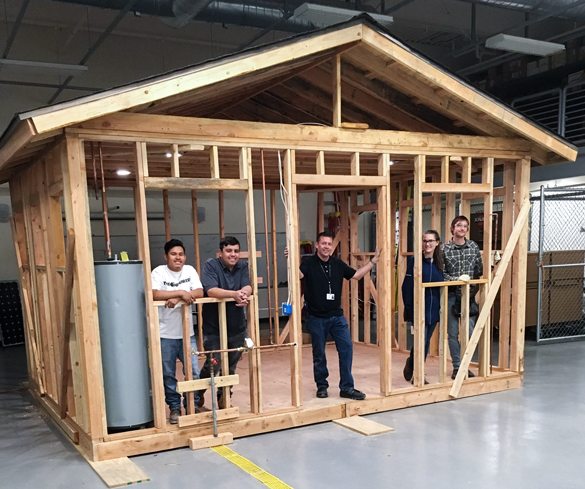Class B General Building Contractor License
 The Construction program here at College of the Canyons (COC) can assist you with preparing for the California State License Board (CSLB) exam requirements. While COC does not offer a specific contractor licensing preparation program, we have several courses that align with the knowledge areas tested by the California State License Board (CSLB) and can provide valuable skills for passing the licensing exam and working in the field.
The Construction program here at College of the Canyons (COC) can assist you with preparing for the California State License Board (CSLB) exam requirements. While COC does not offer a specific contractor licensing preparation program, we have several courses that align with the knowledge areas tested by the California State License Board (CSLB) and can provide valuable skills for passing the licensing exam and working in the field.
Recommended COC Courses
We offer a range of classes to prepare you for both the exam and real-world construction management. Some valuable ones include:
- Construction Law & Codes: CONST 106, 109, 120, 122, 124
- Planning & Management: CONST 102, 103, 104, 105, 108
- Hands-On Trade Skills: CONST 025, 030, 032, 034, 040, 050, 060
- Safety: OSHA 10 or 30 (highly recommended)
- Does Your Education Count Toward the Experience Requirement?
Yes, your education can count toward the four years (or 48 months) of journey-level experience required for a Class B General Building Contractor License through the California State License Board (CSLB). However, how much your education counts depends on what type of degree you complete: (Qualifying Experience for the Examination)- Associates Degree in construction-related field: up to 1.5 years (18 months) of experience credit
- Bachelor’s Degree in Construction Management, Architecture, Civil Engineering, or related: up to 2 years (24 months) of experience credit
- No credit is given for unrelated degrees or non-degree certificates alone.
- Does Working While Studying Help Reduce the Time?
Yes! If you're gaining journey-level experience (paid work performing hands-on or supervisory construction tasks) while pursuing your degree, both count—but they do not "stack" to reduce time further. CSLB will count the time you worked as journey-level experience, and separately, your degree may offset part of the experience requirement. They will take the higher value between the two, not combine them. So, your education and work are both valuable—just not “doubled.”
Example: If you complete a Bachelor’s in Construction Management and also work 3 years at a journey-level position during that time, CSLB may still only credit you with 3 years total, not 5. -
What Education Path Should You Take?To maximize your time and investment, consider pursuing an Associate Degree in Construction Management here at College of the Canyons or a Bachelor’s degree in a related field (if transferring). These options:
- Help you gain education credit toward your license
- Build essential knowledge in construction law, estimating, safety, and scheduling
- Prepare you to run your own business as a contractor or developer
- Looking for more information on the process?
Check out the resources on the CSLB Applicant page.
https://www.cslb.ca.gov/Contractors/Applicants/


 My Canyons
My Canyons  Canvas
Canvas 
